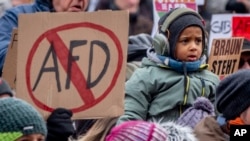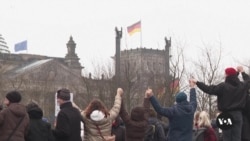Germany is debating a ban on the Alternative for Germany (AfD) party amid mass protests across the country against far-right extremism. The discussion follows revelations last month that senior AfD politicians attended a secret meeting where the forcible deportation of migrants, including German citizens, was discussed.
Details of the meeting, published by the investigative organization Correctiv on January 15, evoked painful memories in Germany, a country especially sensitive to fears of far-right extremism given its 20th-century history.
However, any action against the AfD would be highly controversial as the party is polling in second place ahead of crucial elections later this year.
An estimated 150,000 protesters joined hands around the German parliament building in Berlin on Saturday to form what they called a symbolic “firewall” against right-wing extremism. Similar demonstrations were held in cities across Germany.
Senior German politicians were among those attending the protests. “I want to make it very clear that the civil society is sending out a signal here, that the civil society is standing up, opening its mouth and making it clear that the AfD will never gain power in this country. We will all take a clear stand against it,” Saskia Esken, head of the ruling Social Democratic Party, told Reuters.
Explosive revelations
Nationwide protests have been held every weekend since mid-January, when the Correctiv article was published. The group’s managing director, Jeannette Gusko, described the revelations as “explosive.”
“At the meeting, neo-Nazis, donors and AfD politicians spoke very specifically about the realization of the expulsion of millions of people from Germany. And this is a situation in which the AfD has a real option to gain power. We knew that the research was politically explosive,” Gusko told Reuters. “We knew that, but what is happening now is certainly unique in the history of the Federal Republic of Germany.”
German Chancellor Olaf Scholz briefly joined a protest march in Potsdam, outside Berlin, and welcomed the show of anger at the AfD.
“There are a lot of demonstrations planned against the right-wing extremist enemies of our democracy," Scholz said in a televised address on January 19. "I find that’s right and good. If there is something in Germany which must never ever find a place again, it is the national race ideology of the Nazis. The repulsive relocation plans by these extremists is just that.”
AfD response
AfD co-chairperson Alice Weidel has called the report a “left-wing campaign.” Among those attending the meeting was Roland Hartwig, who was Weidel’s senior aide in the AfD. Local media reported that Hartwig has not held that position since the Correctiv article was published.
“It is scandalous when left-wing activists attack a private meeting with Stasi-like secret service and subversive methods in order to eavesdrop and spy on innocent citizens,” Weidel said.
“The real enemies of the constitution are those who call for a ban on parties, for the deprivation of basic civil rights and the so-called protection of the constitution exploited as a political instrument, because they cannot accept the possibility of a democratic transfer of power to the opposition,” she said on January 16, one day after the Correctiv article was published.
Germany’s painful history before and during World War II, under Adolf Hitler and the Nazis, makes it acutely sensitive to fears of right-wing extremism.
“Germany in particular has a history that they cannot afford, in any way, shape or form, to allow anything like this to happen,” said Matt Qvortrup, a professor of political science and international relations at Coventry University in England, and an author on Germany.
Calls for ban
There are growing calls for the AfD to be banned. Qvortrup said it’s vital that action is taken.
“The forced transfer of people to other places sounds very familiar in a German context. And frankly, Germany cannot afford that. In this case, the Article 21 of the German constitution says anything that will undermine or challenge the German democratic order is unconstitutional,” he told VOA. “There is then a process whereby the Ministry of the Interior will refer a particular party to the Supreme Court.”
That would be a highly controversial step against the AfD, a party that is polling in second place nationally, on around 20%.
“People will say, ‘Well, they’re not that bad yet, they’re not that dangerous.’ But that’s what we’ve always said. … I think democracies have to fight back. Democracies can’t just think they will last forever,” Qvortrup added.
Election campaigns are already underway in some parts of Europe ahead of EU parliamentary elections scheduled for June, where right-wing populist parties are expected to do well. Meanwhile, state elections are due in September in the east of Germany, traditionally a stronghold for the AfD party.









